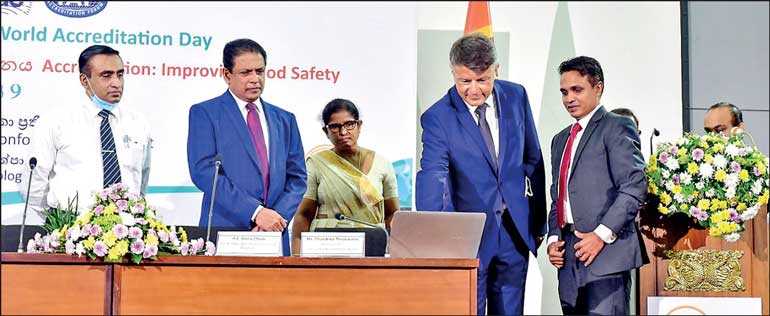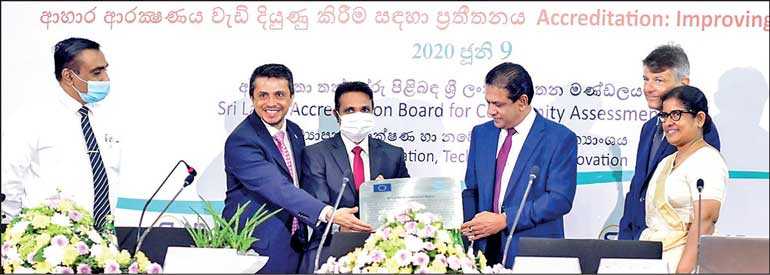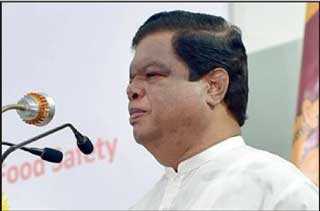Saturday Feb 28, 2026
Saturday Feb 28, 2026
Thursday, 11 June 2020 00:00 - - {{hitsCtrl.values.hits}}


The Sri Lanka Accreditation Board joined the world community on 9 June 2020 to mark World Accreditation Day, a global initiative established by the International Laboratory Accreditation
 |
Minister of Higher Education, Technology and Innovation and Information and Mass Media Bandula Gunawardana speaking at the event |
Cooperation (ILAC) and International Accreditation Forum (IAF) to promote the value of accreditation. Building on World Accreditation Day 2019, which highlighted the role of accreditation in adding value to supply chains, this year spotlights the role of accreditation in facilitating the confidence of consumers, suppliers, regulators and specifiers in the safety and quality of food.
Accreditation bodies assess conformity assessment bodies (CAB) providing conformity assessment services against voluntary international standards developed and set by the global community through the International Organization for Standardization (ISO) and International Electrotechnical Commission (IEC). These standards cover accreditation activities such as testing, calibration, inspection, and certification to demonstrate that services delivered are competent and impartial in all parts of local, national and international food chains.
Transparency across supply chains depend on CABs that are accredited to issue certifications to a specific standard. Regulators and businesses rely on certified supply chains for the demonstration of compliance. With the support of the United Nations Industrial Development Organization (UNIDO) within the framework of the European Union (EU) funded EU-Sri Lanka Trade-Related Assistance project of Euro 8 million, the Sri Lanka Accreditation Board will mark this day with several milestones, including the launch of an interactive website embedded with a finely-tuned search engine for a database of accredited conformity assessment services.
The website offers an enhanced user experience and touch points for greater client engagement to help industries choose the right conformity assessment service for their business. This database includes more than 150 accredited conformity assessment services over 120 CABs covering 12 sectors. The aggregation of the range of services in one database streamlines the matching of conformity assessment-related demand and supply. This high standard, user-friendly and conversion-optimised website not only facilitates access to pertinent data, but also serves as an online training platform for continued education for standards bodies, accredited bodies, CABs, and regulatory agencies and for customer education on relevant accreditation and certification processes.
Speaking at the event, EU Ambassador to Sri Lanka and the Maldives Denis Chaibi stated, “If there is one of many common points between Sri Lanka and Europe is that we each take food seriously. And food safety even more seriously! Europeans want to import Sri Lankan food products that
are good and safe. And they also want to export to Sri Lanka European products that are good and safe. For that, we need to do testing and have good accredited labs that are internationally recognised to perform them in Sri Lanka and in the EU. For this, I congratulate the Sri Lanka Accreditation Board, which is taking these vital steps to ease the process of accreditation as accreditation is of paramount importance to Sri Lanka in trading with the EU.”
A joint statement released by the Chairpersons of IAF and ILAC introduced the importance of accreditation in food safety, noting how it ensures competent and impartial inspection, certification and testing services in all parts of local, national and international food chains. In doing so, accreditation supports the United Nations Sustainable Development Goals (SDGs), particularly Goal 3: Ensure healthy lives and promote well-being for all.